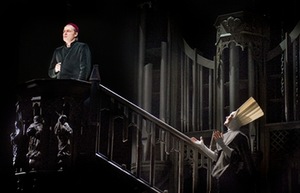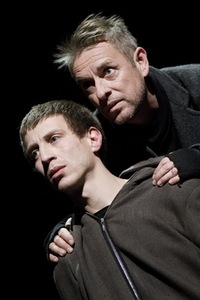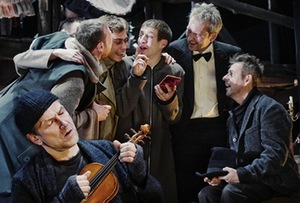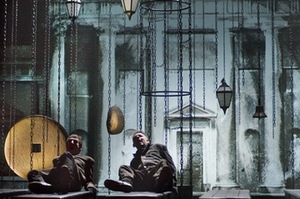FURTHER – DARKNESS? 1
In brief: The author of the article was surprised to find out that the following work of the director Oskaras Koršunovas after “Banishment” would be “Cathedral” of Justinas Marcinkevičius in Lithuania. One of the two possibilities was probable – either the director would read classics as a contemporary work and inspire life to it, as it happened with dramas of Shakespeare, or he would succumb to romantic ideas of the nation, talent and fight and vanish himself in them.
The idea of nationality is related with a rebellion in the drama. As for the performance “Cathedral”, the theme of an artist’s rebellion, no matter that it was unsuccessful, seems to be more perspective than that of the nation. The first rebels mentioned in the performance are artists. Their revolt against the suppression of Lithuania sounds like a rebellion against their patrons, fight for freedom of creation, despite the fact that they do not like to acknowledge their captivity.
Unfortunately, all rebellions – artistic and military – appear to be worthless: artists rebels die, the only blind violinist who preserved freedom recants his song of heart, and Larynas, who is half-rebel and half-hireling reconciles with his fate and admits the senselessness of rebellion.
Direction and set design (Vytautas Narbutas) solutions add to the theme of the senseless rebellion. O.Koršunovas, who cited and tongued the great directors of our country in the majority of his performances, seems to apply another strategy in the “Cathedral” – he rallies his own solutions and uses the experience of his direct and indirect teachers even too seriously. It seems that works of the most outstanding Lithuanian directors Eimuntas Nekrošius, Jonas Vaitkus were united in the performance and that O.Koršunovas stopped fighting for his identity and his theatre in the “Cathedral”. It seems that he succumbed to history, tradition, circumstances, personalities and crises of the society.
True, the world created in the drama impels to succumb: one feels chagrined at everything and everybody here. Laurynas (performed by Marius Repšys) gives up on his patron, love, belief and himself. Ieva–Teresė (performed by Monika Vaičiulytė) dies of frustration. While the parts of Ieva-Teresė and Masalskis (performed by Vytautas Anužis) seem to be over-acted, the part of Laurynas is like refreshment – the role is sensitive and fluent, it is deep although it has some shortages. Nonetheless, neither this part nor music created by Antanas Jasenka forming the suitable atmosphere in the performance help the “Cathedral” become a moving staging.
The author regrets that the drama of Just. Marcinkevičius overcame O. Koršunovas, nostalgia took over the present, romanticism – over post-structuralism, conciliation – over the senseless flight which, however, maintains the vitality.




